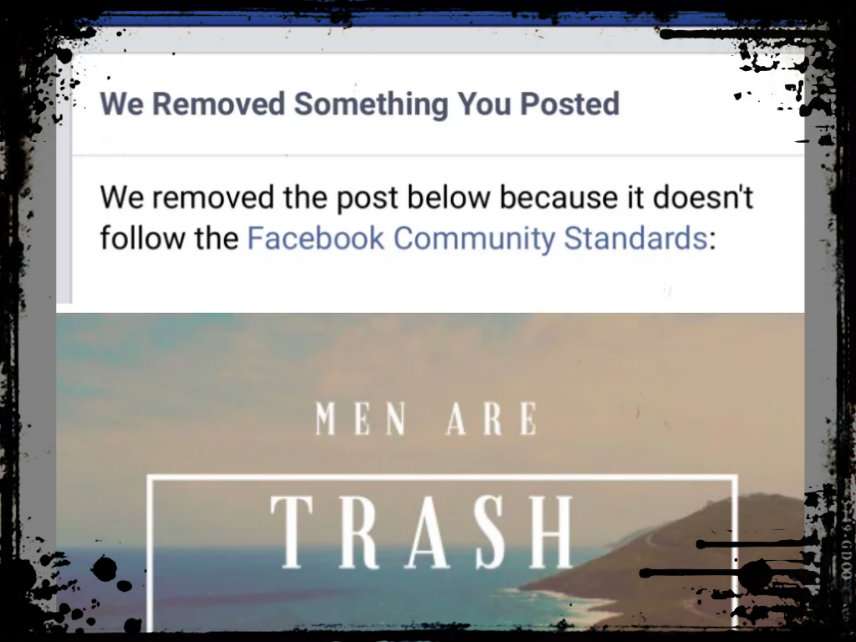Calling Men 'Scum' or 'Trash' Is Now Hate Speech
"Facebook jailing" over mild insults shows how far "hate speech" policing has creeped—and the folly of actual laws against it.

Dozens of female comedians have had their Facebook accounts suspended for posting derogatory messages about men. Facebook justified these suspensions by describing the women's words as "hate speech."
Their messages weren't about specific men, mind you; we're not talking about targeted harassment here. They said things like "men are scum" and "men are trash," statements made in response to harassment they were receiving from men or in solidarity with other women going through such pile-ons.
Just to be clear, I do not think all men are scum. And from the sound of it, neither did most of these women. These were mostly hyperbolic or emotional responses to current events and to direct comments from other Facebook users. But rhetorical flourish or sincerely held belief, these PG-rated insults should be allowed on any social platform that lays claim to fostering open communication.
Facebook, obviously, is a private company that can set its own rules. And to be sure, there is no generally agreed-upon definition, no legal category (not in the U.S., anyway), of "hate speech." Determining hate speech here is purely subjective and observational.
Some people using the term take it to mean some combination of speech that actually isn't protected by the First Amendment (like true threats and incitements to imminent violence); targeted bullying that's mean but not actually illegal; and whatever words or sentiments they find cruel and uncomfortable: taboo slurs, graphic language, the expression of negative ideas about a particular group or ideas that violate social norms.
Most people, I think, would not take "men are scum" to be hate speech. I don't think many would even take issue if the sexes were reversed. At least not when expressed in a general way, as was the case with the Facebook suspensions.
Things wouldn't be so clear-cut if the group was more particularized, however. Posting that "transgender people are scum" or "Muslims are trash" would probably be labeled as hate-speech. Calling libertarians or communists scum, probably not. "The British are trash?" Probably not. "Mexicans are trash?" Probably so.
I'm not trying to complain here that statements take on different nuances depending on context and power differentials. Quite the opposite. This is a feature of functioning dialogues that has been vastly diminished in the social-media era. But the openness of most speech to interpretation, the way meanings can shift based on who is saying what to whom, and the context collapse of social media are exactly what makes "hate speech" laws and policies so pernicious.
On Facebook and Twitter, these determinations seem to be made haphazardly and randomly. The decisions sometimes bow to social pressure and online mobs, are sometimes faulty by means of negligence, and sometimes guided by the biases and preferences of low-level employees or internal algorithms. The results can seem unfair, to feminist comedians, to alt-right activists, to Federal Communications Chairman Ajit Pai…. the list goes on and on.
Alas, a desire across the political spectrum to be shielded from criticism, combined with a culture of weaponized social-media reporting on most sides, has led us to the point where all public discourse is treated like that of the most precious liberal-arts-college classroom. And rather than face any potential backlash, platforms like Facebook have learned to treat even the most anodyne of insults as actionable "hate."
But the consequences of being labeled a hate-speaker in this context are relatively minor. Sure, social platforms can be important career tools these days, and even temporary suspensions can hurt, but no one is getting thrown in a cage or having their home seized by Mark Zuckerberg and Jack Dorsey.
When we give the state the power to regulate hate speech, the determinations tend to be every bit as random and biased. More so, perhaps. Facebook has nothing to gain from taking sides in ideological arguments. Government hate-speech enforcers laws do. Time and again, whomever is in power will use the laws to suppress political opponents or populist uprisings or people who Tweet mean things at them.
Occasionally this benefits progressive or radical causes. But it's much more likely to be used against radicalism, against any marginalized groups, and in furtherance of the status quo. Only this time, it's not just a Facebook account at stake but one's property, reputation, liberty, and possibly life.
Hate speech laws can never truly serve the fight to speak truth to power.
